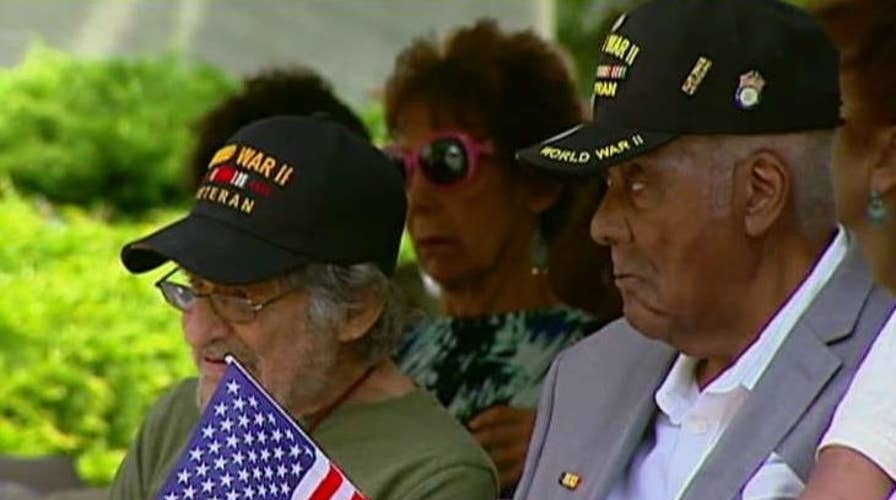What Trump needs to do to fix the state of veterans' affairs
Fox News Contributor, Army vet Pete Hegseth sounds off
Between his vows to replace ObamaCare, build a border wall and renegotiate trade pacts, President Trump’s inbox is mighty full his first week in office.
But one of the biggest challenges will be the Department of Veterans Affairs, where massive problems persist – many in the same hospital that was the epicenter of the waiting-list scandal that rocked the agency, and shocked the public, in 2014.
“Until Congress passes strong accountability measures, VA employees from top to bottom will have little incentive to change this toxic culture,” said Mark Lucas, executive director of Concerned Veterans for America, a veterans’ advocacy group.
A recent survey of employees at the Phoenix facility reported employees have little confidence in the integrity of their supervisors -- findings Lucas called “unsurprising.” Two government audits also found little improvement and costly inefficiencies in the agency as a whole.
Trump, who vowed during the campaign to overhaul the scandal-scarred department, has nominated Dr. David Shulkin, a VA undersecretary in the Obama administration, to take over.
If confirmed, Shulkin and Trump together will confront problems that extend well beyond morale issues.
The Government Accountability Office for the third year reportedly will place the VA health system on its “high risk” list when it’s released in February, because of continued problems of waste, fraud or mismanagement. The forthcoming report will say the VA has showed “only limited progress” since the scandal erupted.
The VA Office of Inspector General also reported earlier this month that in 2015, the VA awarded more than $177 million in improper relocation or retention bonuses based on inaccurate information to 238 different employees, many of them executives. The report blamed the VA for “ineffective oversight processes to ensure compliance,” and “ineffective procedures to recoup funds from individuals with outstanding recruitment and relocation incentive service obligations.”
And the January survey of employees at the Carl T. Hayden VA Medical Center in Phoenix – which has had seven directors since 2014 revelations about VA officials falsifying patient wait times as some died waiting for care – found fewer than one-third of employees feel their supervisors have integrity or that whistleblowers would be protected.
Trump’s 10-point plan to reform the VA included firing bad employees; creating a special commission to investigate cover-ups; and ensuring veterans have the option of VA vouchers for private health care.
The department clearly is still high risk. Yet some of Trump’s goals already are in the process of being realized, said Joe Chenille, executive director for the veterans advocacy group AmVets.
“We have gone from 19 percent getting care from outside sources, paid for by the VA, to 31 percent,” Chenelly told Fox News. “My prediction is a surge of people will want care outside the system.”
Shulkin, who has experience as a hospital CEO, came to the agency with now-former VA Secretary Bob McDonald to make reforms after the scandal, and has the confidence right now of the Trump administration.
“Dr. Shulkin is a nationally-recognized turnaround artist, health care leader, and passionate veterans advocate who is eager to transform the VA and will be able to do so in the Trump administration,” Trump spokesman David White said. “If confirmed, Dr. Shulkin will be ready on day one to enact President Trump’s 10-point plan to end mismanagement and incompetence at the VA, and ensure our veterans get the timely, quality care and support they deserve.”
A VA spokeswoman declined to comment and deferred to the Trump team.
A new VA secretary isn’t enough, though, said Lucas of the CVA.
“These are problems that arose as a result of a system that is set up to fail, a system no one leader can change without meaningful reforms from Congress,” Lucas said. “The VA needs to be transparent with veterans and taxpayers about its performance and how money is being spent. But most importantly, veterans deserve to be empowered with choice over where and when to see a doctor.”
In September, RimaAnn Nelson, became the seventh director of the Phoenix veterans health system since the 2014 scandal. Nelson is no stranger to other VA controversies. She previously was director of the St. Louis system, where an inspector general report determined 1,812 patients were potentially exposed to hepatitis and HIV infections because of breaches in cleaning and sterilization of medical equipment.





